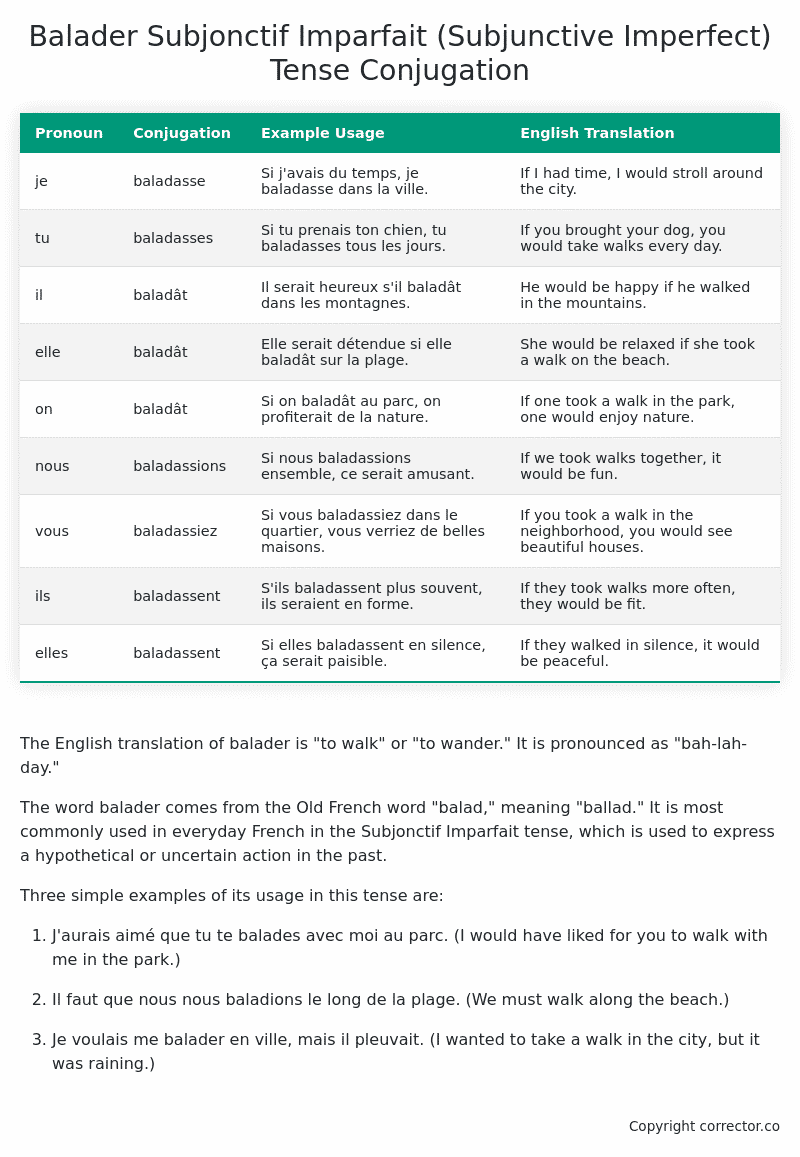Subjonctif Imparfait (Subjunctive Imperfect) Tense Conjugation of the French Verb balader
Introduction to the verb balader
The English translation of balader is “to walk” or “to wander.” It is pronounced as “bah-lah-day.”
The word balader comes from the Old French word “balad,” meaning “ballad.” It is most commonly used in everyday French in the Subjonctif Imparfait tense, which is used to express a hypothetical or uncertain action in the past.
Three simple examples of its usage in this tense are:
-
J’aurais aimé que tu te balades avec moi au parc. (I would have liked for you to walk with me in the park.)
-
Il faut que nous nous baladions le long de la plage. (We must walk along the beach.)
-
Je voulais me balader en ville, mais il pleuvait. (I wanted to take a walk in the city, but it was raining.)
Table of the Subjonctif Imparfait (Subjunctive Imperfect) Tense Conjugation of balader
| Pronoun | Conjugation | Example Usage | English Translation |
|---|---|---|---|
| je | baladasse | Si j’avais du temps, je baladasse dans la ville. | If I had time, I would stroll around the city. |
| tu | baladasses | Si tu prenais ton chien, tu baladasses tous les jours. | If you brought your dog, you would take walks every day. |
| il | baladât | Il serait heureux s’il baladât dans les montagnes. | He would be happy if he walked in the mountains. |
| elle | baladât | Elle serait détendue si elle baladât sur la plage. | She would be relaxed if she took a walk on the beach. |
| on | baladât | Si on baladât au parc, on profiterait de la nature. | If one took a walk in the park, one would enjoy nature. |
| nous | baladassions | Si nous baladassions ensemble, ce serait amusant. | If we took walks together, it would be fun. |
| vous | baladassiez | Si vous baladassiez dans le quartier, vous verriez de belles maisons. | If you took a walk in the neighborhood, you would see beautiful houses. |
| ils | baladassent | S’ils baladassent plus souvent, ils seraient en forme. | If they took walks more often, they would be fit. |
| elles | baladassent | Si elles baladassent en silence, ça serait paisible. | If they walked in silence, it would be peaceful. |
Other Conjugations for Balader.
Le Present (Present Tense) Conjugation of the French Verb balader
Imparfait (Imperfect) Tense Conjugation of the French Verb balader
Passé Simple (Simple Past) Tense Conjugation of the French Verb balader
Passé Composé (Present Perfect) Tense Conjugation of the French Verb balader
Futur Simple (Simple Future) Tense Conjugation of the French Verb balader
Futur Proche (Near Future) Tense Conjugation of the French Verb balader
Plus-que-parfait (Pluperfect) Tense Conjugation of the French Verb balader
Passé Antérieur (Past Anterior) Tense Conjugation of the French Verb balader
Futur Antérieur (Future Anterior) Tense Conjugation of the French Verb balader
Subjonctif Présent (Subjunctive Present) Tense Conjugation of the French Verb balader
Subjonctif Passé (Subjunctive Past) Tense Conjugation of the French Verb balader
Subjonctif Imparfait (Subjunctive Imperfect) Tense Conjugation of the French Verb balader (this article)
Subjonctif Plus-que-parfait (Subjunctive Pluperfect) Tense Conjugation of the French Verb balader
Conditionnel Présent (Conditional Present) Tense Conjugation of the French Verb balader
Conditionnel Passé (Conditional Past) Tense Conjugation of the French Verb balader
L’impératif Présent (Imperative Present) Tense Conjugation of the French Verb balader
L’infinitif Présent (Infinitive Present) Tense Conjugation of the French Verb balader
Struggling with French verbs or the language in general? Why not use our free French Grammar Checker – no registration required!
Get a FREE Download Study Sheet of this Conjugation 🔥
Simply right click the image below, click “save image” and get your free reference for the balader Subjonctif Imparfait tense conjugation!

Balader – About the French Subjonctif Imparfait (Subjunctive Imperfect) Tense
Formation
Common Everyday Usage Patterns
Interactions with Other Tenses
Subjonctif Présent
Indicatif Passé Composé
Conditional
Conditional Perfect
Summary
I hope you enjoyed this article on the verb balader. Still in a learning mood? Check out another TOTALLY random French verb conjugation!


